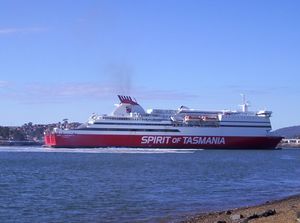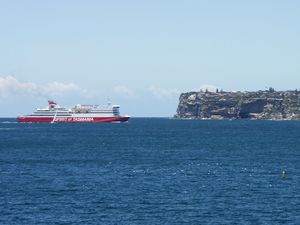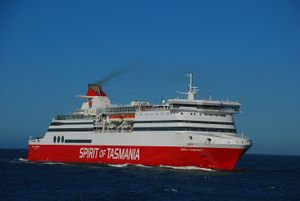TT-Line Company
| Type | Government enterprise |
|---|---|
| Industry | Transport |
| Founded | 1 November 1993 |
| Headquarters | Template:Country data AUS Devonport, Tasmania, Australia |
| Key people |
Graeme Sturges (Minister for Infrastructure) Charles Griplas (CEO) Denis Rogers (Chairman) |
| Products | Ferries, passenger transportation, freight transportation, holidays, business travel |
| Revenue |
|
| Net income |
|
| Employees | 700 |
| Website | www.spiritoftasmania.com.au/ |
TT-Line Company Pty. Ltd.[1] is a company operating ferries from Tasmania to the mainland of Australia since 1985. The company was separated from the department of Transport Tasmania in 1993, becoming a government business enterprise wholly owned by the Government of Tasmania.
Contents
History
1985-1992
TT-Line (Tasmania) was formed in 1985 following the announcement that the Australian National Line (ANL) would no longer operate a service across Bass Strait.
After the cessation of ANL operations to Tasmania, the Tasmanian state's Department of Transport began a replacement ferry service, selecting the West German ferry Nils Holgersson (3) for $AUD 26 million. That amount was offset by a payment from the Australian federal government in compensation for placing the environmentally-sensitive Gordon River off-limits to Hydro Tasmania power generation schemes. The Nils Holgersson (3) was renamed Abel Tasman on 21 April 1985, and set sail for Australia, she arrived in Devonport on 20 June and began operating on 1 July 1985 from Melbourne's Station Pier.
1993-2001
In 1993 TT-line Tasmania replaced the aging Abel Tasman with another ex TT-Line (Germany) ferry. The new ship, Peter Pan (3), had replaced the former Nils Holgersson (3) (now Abel Tasman) on the Travemünde-Trelleborg route in Germany in 1986. The ship, which was delivered to Lloyd Werft shipyard in September 1993 and was renamed Spirit of Tasmania, cost the Government AUD$150 million . The ferry left Germany on 5 October and arrived in Devonport 12 November.
On 1 November 1993 the original Tasmanian Department of Transport was replaced with the TT-line Pty Ltd, a business wholly owned by the state government of Tasmania.
The Spirit of Tasmania made her first commercial crossing of Bass Strait on the night of 29 November 1993 and on that morning the Abel Tasman was laid-up and offered for sale, which was completed in April 1994, to the Ventouris group for AUD$ 24.7 million.
While the Spirit of Tasmania was dry-docked in 1997, the TT-line chartered a large multi-hull ferry, the Incat 045, from Incat, dubbing her Tascat. She was used for two weeks as an experiment. In the peak season of 97/98 TT-line chartered an Incat 046 to operate as Devil Cat from the old SeaCat Tasmania terminal in George Town to Station Pier. TT-line repeated this over the 98/99 peak season with the new Incat 050 (also marketed under the name Devil Cat).
In September 1999, the Spirit of Tasmania was forced out of action for two weeks due to fuel contamination, and TT-line chartered the Incat 030 HSC Condor 10 which at the time was laid up in New Zealand as The Lynx. Once TT-Line arranged for the charter she immediately departed New Zealand and arrived in Tasmania 2 days later, and entered service to cover for the Spirit of Tasmania. Over the 99/00 summer season TT-line again charted a fast craft while the former Devil Cat Incat 046 was used on the Georgetown-Melbourne route during this peak period for three successive years.
2002
In 2002 the Tasmanian Government and TT-line announced that they would be replacing the Devil Cat and the Spirit of Tasmania with two Finnish built monohull ferries Superfast III & Superfast IV later that year at a price of AUD$290 million from Greek ship owner Attica Enterprises. The Superfast III & IV where handed over at the Neorion shipyard on the island of Syros where they had been refitted. Superfast III was renamed Spirit of Tasmania II and departed on 6 July and Superfast IV renamed Spirit of Tasmania I and departed 7 July. They set off for Australia both arriving in Hobart 29 July where the final touches were put into place. After public inspections at Hobart, Melbourne and Devonport the two new ships set sail on 1 September Spirit I from Devonport and Spirit II from Melbourne.
Earlier that day Spirit of Tasmania arrived in Melbourne for the last time crossing Bass Strait 2,849 times carrying 2.3 million passengers, 807,000 cars and 185,000 containers safely across Bass Strait. She contributed AUD$160 million annually each year into Tasmania’s economy. Spirit of Tasmania Departed Melbourne just before midnight on 5 September headed for Sydney where she arrived on 7 September. In late December in was announced that the ship had been sold to Nordsjøferger (Fjord Line) for AUD$61 million.
2003-Present
In March 2003 it was announced that TT-line would be operating a third ship 'Spirit of Tasmania III from Devonport – Sydney beginning early 2004. the new ship was also a Superfast ship as Spirits I & II this one was Superfast II a German built ferry completed in 1995 for Attica Enterprises's Subsidiary Superfast Ferries. Superfast II was handed over to TT-line 30 September and went to the Nerion yard for refitting after the works and renaming to Spirit of Tasmania III, she set off on the evening of 10 October. She arrived in Hobart on 30 October berthing No.6 Macquarie wharf for more fitting out to be done. Spirit of Tasmania III set out for a voyage from Hobart – Devonport with 500 people aboard. She stayed in Devonport for a day and then moved on Melbourne then to Sydney. Spirit of Tasmania III made her maiden run from Sydney-Devonport 13 January 2004.

On 5 June the Tasmanian Government announced that the Sydney – Devonport service would cease on 28 August onwards and the ship to be sold.
It was announced 11 July 2006 that Spirit of Tasmania III would be sold to Corsica Ferries for AUD$111 million (65 million Euros) she has now been re-named Mega Express Four
In the 2006/2007 financial year TT-line made a profit of 10.6 million AUD with an underling operational profit of 4.2 million AUD. Although TT-Line’s revenue was down on last financial year the profit is up. (Due to the sale of the loss operating Spirit of Tasmania III) TT-line expects to have an even harder time this year with more low cost air lines entering the scene in Tasmania, but they are hopeful to continue the growth of the company. In doing so they have enclosed the aft garage space abord the Spirit of Tasmania I & Spirit of Tasmania II. Also they have added mezzanine decks, allowing an additional 60 cars to be carried for peak season. Additionally the cinema is now used exclusively as a cinema, whereas before it was also used as a passenger seating area.
On 29 February 2008 Mr Charles Griplas took over the job as CEO from Peter Simmons who retired after 12 years with the company. Peter Simmons remained as a consultant to the company until 1 July 2008.[2]
Fleet


Present ferries
- MS Spirit of Tasmania I (2002 - )
- MS Spirit of Tasmania II (2002 - )
Past ferries
- Abel Tasman (1985-1994) Now Theofilos of Nel lines (Greece)
- Incat 045 Tascat (1997) Now Condor Rapide of Condor Ferries
- Incat 046 Devil Cat (1997-1998 1999-2002) Now T&T Express of Government of Trinidad and Tobago
- Incat 050 Devil Cat (1998-1999) Currently incat 050 of Isle of Man Steam Packet Company
- Incat 030 Condor 10 (1999) Now Condor 10 of Condor Ferries (England)
- Spirit of Tasmania (1993-2002) Now Princess of Norway of DFDS Seaways (Denmark)
- Spirit of Tasmania III (2003-2006) Now Mega Express Four of Corsica Ferries (Italy)
Gallery
- Oriana and Spirit of Tasmania.JPG
mv Oriana, astern of Spirit of Tasmania I, March 2006
- Station Pier 2006.jpg
Spirit of Tasmania I, Station Pier March 2006
- Spirit of Tasmania I 21Feb08.JPG
Spirit of Tasmania I, Station Pier, February 2008
- Queen Victoria and Spirit of Tasmania I.JPG
Spirit of Tasmania I and Queen Victoria, Station Pier, February 2008
- The Spirit of Tasmania sailing through Port Phillip Bay in dusk seen from Elwood Beach.jpg
Spirit of Tasmania sailing through Port Phillip Bay in dusk seen from Elwood Beach.
- Spirit Of Tasmania I Devonport.JPG
Spirit of Tasmania I enters into Port Frederick at Devonport, December 2007
- Spirit of Tasmania I enters into Devonport.JPG
Spirit of Tasmania I in the Mersey river Devonport
- Spirit of Tasmania river1.jpg
Spirit of Tasmania I in Mersey river Devonport.
References
- ↑ http://search.asic.gov.au/cgi-bin/gns030c?acn=061_996_174&juris=9&hdtext=ACN&srchsrc=1
- ↑ "TT-Line Company Pty Ltd appoints new CEO". TT-Line Pty. Ltd.. 2007-11-29. http://www.spiritoftasmania.com.au/mediaroom/releases/2007/ttlineCEO.htm. Retrieved 2007-12-07.
Books:
- Ferry to Tasmania, A short History by Peter Plowman, ISBN 1 877058 27 0.
- Super~Ferries of Britain, Europe and Scandinavia by Russell Plummer, ISBN 0 85059 7.
Internet:
External links
| Spirit of Tasmania
]]- Spirit of Tasmania
- Information and photos of TT-Line Tasmania ferries
- Photos of TT-line ships
- TT-line on Fakta om Fartyg (Swedish)


